19 start with E start with E

What is the relationship between religious belief and the study of nature, between theology and science? This is the fundamental preoccupation of the three different studies in Einstein, Polanyi, and the Laws of Nature.
By exploring the highly original yet little-known thought of Michael Polanyi, Jaeger highlights the inherent personal investment in any quest for knowledge, including the scientific enterprise, thus raising the question of the objectivity of human knowledge. Considered to be the most incredible mind of the twentieth century, Albert Einstein saw scientific research as the fruit of the “cosmic religion.” His response to the question of the relationship between faith and science also receives the close analysis it deserves. Finally, Jaeger is interested in science’s propensity to use the concept of laws of nature, an idea also found in the Bible. She paves the way for interdisciplinary dialogue by examining the similarities and differences.
The synthesis of these three complementary studies brings out the collaboration between belief and knowledge, thus establishing a bridge between two noble human activities: faith and scientific research. It will interest all serious followers of the ongoing science and religion dialogue.

Napoleon’s campaigns were the most complex military undertakings in history before the nineteenth century. But the defining battles of Austerlitz, Borodino, and Waterloo changed more than the nature of warfare. Concepts of chance, contingency, and probability became permanent fixtures in the West’s understanding of how the world works. Empire of Chance examines anew the place of war in the history of Western thought, showing how the Napoleonic Wars inspired a new discourse on knowledge.
Soldiers returning from the battlefields were forced to reconsider basic questions about what it is possible to know and how decisions are made in a fog of imperfect knowledge. Artists and intellectuals came to see war as embodying modernity itself. The theory of war espoused in Carl von Clausewitz’s classic treatise responded to contemporary developments in mathematics and philosophy, and the tools for solving military problems—maps, games, and simulations—became models for how to manage chance. On the other hand, the realist novels of Balzac, Stendhal, and Tolstoy questioned whether chance and contingency could ever be described or controlled.
As Anders Engberg-Pedersen makes clear, after Napoleon the state of war no longer appeared exceptional but normative. It became a prism that revealed the underlying operative logic determining the way society is ordered and unfolds.

The most important work by one of America's greatest twentieth-century philosophers, Empiricism and the Philosophy of Mind is both the epitome of Wilfrid Sellars' entire philosophical system and a key document in the history of philosophy. First published in essay form in 1956, it helped bring about a sea change in analytic philosophy. It broke the link, which had bound Russell and Ayer to Locke and Hume--the doctrine of "knowledge by acquaintance." Sellars' attack on the Myth of the Given in Empiricism and the Philosophy of Mind was a decisive move in turning analytic philosophy away from the foundationalist motives of the logical empiricists and raised doubts about the very idea of "epistemology."
With an introduction by Richard Rorty to situate the work within the history of recent philosophy, and with a study guide by Robert Brandom, this publication of Empiricism and the Philosophy of Mind makes a difficult but indisputably significant figure in the development of analytic philosophy clear and comprehensible to anyone who would understand that philosophy or its history.
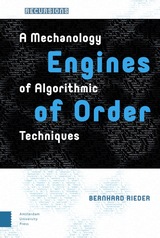
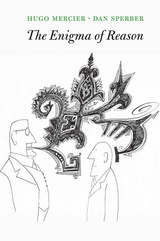
“Brilliant…Timely and necessary.” —Financial Times
“Especially timely as we struggle to make sense of how it is that individuals and communities persist in holding beliefs that have been thoroughly discredited.”
—Darren Frey, Science
If reason is what makes us human, why do we behave so irrationally? And if it is so useful, why didn’t it evolve in other animals? This groundbreaking account of the evolution of reason by two renowned cognitive scientists seeks to solve this double enigma. Reason, they argue, helps us justify our beliefs, convince others, and evaluate arguments. It makes it easier to cooperate and communicate and to live together in groups. Provocative, entertaining, and undeniably relevant, The Enigma of Reason will make many reasonable people rethink their beliefs.
“Reasonable-seeming people are often totally irrational. Rarely has this insight seemed more relevant…Still, an essential puzzle remains: How did we come to be this way?…Cognitive scientists Hugo Mercier and Dan Sperber [argue that] reason developed not to enable us to solve abstract, logical problems…[but] to resolve the problems posed by living in collaborative groups.”
—Elizabeth Kolbert, New Yorker
“Turns reason’s weaknesses into strengths, arguing that its supposed flaws are actually design features that work remarkably well.”
—Financial Times
“The best thing I have read about human reasoning. It is extremely well written, interesting, and very enjoyable to read.”
—Gilbert Harman, Princeton University
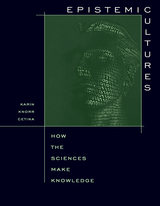
How does science create knowledge? Epistemic cultures, shaped by affinity, necessity, and historical coincidence, determine how we know what we know. In this book, Karin Knorr Cetina compares two of the most important and intriguing epistemic cultures of our day, those in high energy physics and molecular biology. Her work highlights the diversity of these cultures of knowing and, in its depiction of their differences--in the meaning of the empirical, the enactment of object relations, and the fashioning of social relations--challenges the accepted view of a unified science.
By many accounts, contemporary Western societies are becoming "knowledge societies"--which run on expert processes and expert systems epitomized by science and structured into all areas of social life. By looking at epistemic cultures in two sample cases, this book addresses pressing questions about how such expert systems and processes work, what principles inform their cognitive and procedural orientations, and whether their organization, structures, and operations can be extended to other forms of social order.
The first ethnographic study to systematically compare two different scientific laboratory cultures, this book sharpens our focus on epistemic cultures as the basis of the knowledge society.
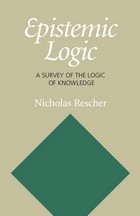
Epistemic logic is the branch of philosophical thought that seeks to formalize the discourse about knowledge. Its object is to articulate and clarify the general principles of reasoning about claims to and attributions of knowledge. This comprehensive survey of the topic offers the first systematic account of the subject as it has developed in the journal literature over recent decades.
Rescher gives an overview of the discipline by setting out the general principles for reasoning about such matters as propositional knowledge and interrogative knowledge. Aimed at graduate students and specialists, Epistemic Logic elucidates both Rescher's pragmatic view of knowledge and the field in general.

Whatever the target of our effort to know—whether we probe the origin of the cosmos, the fabric of man-made symbols and culture, or simply the layout of our immediate environment—all knowledge is grounded in natural cognitive capacities. Philosophers of knowledge must therefore make use of the science of cognition. So argues a leading epistemologist in this work of fundamental importance to philosophical thinking.
Against the traditional view, Alvin Goldman argues that logic, probability theory, and linguistic analysis cannot by themselves delineate principles of rationality or justified belief. The mind’s operations must be taken into account. Part I of his book lays the foundations of this view by addressing the major topics of epistemology: skepticism, knowledge, justification, and truth. Drawing parallels with ethical theory, it provides criteria for evaluating belief formation, problem solving, and probability judgment. Part II examines what cognitive scientists have learned about the basic processes of the mind-brain: perception, memory, representational constraints, internal codes, and so on. Looking at reliability, power, and speed, Goldman lays the groundwork for a balanced appraisal of the strengths and weaknesses of human mental processes.
In establishing a theoretical framework for the link between epistemology and cognitive science, Alvin Goldman does nothing less than redirect the entire field of study.

Epistemology and Inference was first published in 1983. Minnesota Archive Editions uses digital technology to make long-unavailable books once again accessible, and are published unaltered from the original University of Minnesota Press editions.
Henry Kyburg has developed an original and important perspective on probabilistic and statistical inference. Unlike much contemporary writing by philosophers on these topics, Kyburg's work is informed by issues that have arisen in statistical theory and practice as well as issues familiar to professional philosophers. In two major books and many articles, Kyberg has elaborated his technical proposals and explained their ramifications for epistemology, decision-making, and scientific inquiry. In this collection of published and unpublished essays, Kyburg presents his novel ideas and their applications in a manner that makes them accessible to philosophers and provides specialists in probability and induction with a concise exposition of his system.
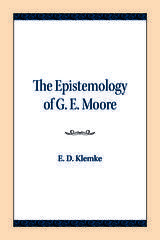
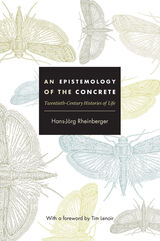
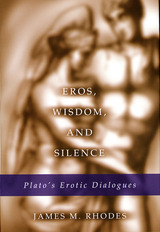
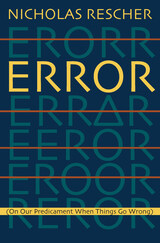
In Error, Nicholas Rescher presents a fresh analysis of the occurrence, causality, and consequences of error in human thought, action, and evaluation. Rescher maintains that error-avoidance and truth-achievement are distinct but equally important factors for rational inquiry, and that error is inherent in the human cognitive process (to err is human). He defines three main categories of error: cognitive (failure to realize truths); practical (failure related to the objective of an action); and axiological (failure in evaluation), and articulates the factors that contribute to each. His discussion also provides a historical perspective on the treatment of error in Greek philosophy, and by later thinkers such as Aquinas, Descartes, Spinoza, Leibniz, James, Royce, Moore, and Russell.
Error is an important reexamination of the significance of error to the fields of philosophical anthropology, epistemology, ontology, and theology. As Rescher’s study argues, truth and error are inexorably intertwined—one cannot exist without the other. Error is an unavoidable occurrence in the cognitive process—without missteps on the path to truth, truth itself cannot be attained. The risk of error is inherent in the quest for truth.

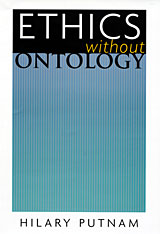
In this brief book one of the most distinguished living American philosophers takes up the question of whether ethical judgments can properly be considered objective—a question that has vexed philosophers over the past century. Looking at the efforts of philosophers from the Enlightenment through the twentieth century, Hilary Putnam traces the ways in which ethical problems arise in a historical context.
Putnam’s central concern is ontology—indeed, the very idea of ontology as the division of philosophy concerned with what (ultimately) exists. Reviewing what he deems the disastrous consequences of ontology’s influence on analytic philosophy—in particular, the contortions it imposes upon debates about the objective of ethical judgments—Putnam proposes abandoning the very idea of ontology. He argues persuasively that the attempt to provide an ontological explanation of the objectivity of either mathematics or ethics is, in fact, an attempt to provide justifications that are extraneous to mathematics and ethics—and is thus deeply misguided.


In the past few decades, scientists of human nature—including experimental and cognitive psychologists, neuroscientists, evolutionary theorists, and behavioral economists—have explored the way we arrive at moral judgments. They have called into question commonplaces about character and offered troubling explanations for various moral intuitions. Research like this may help explain what, in fact, we do and feel. But can it tell us what we ought to do or feel? In Experiments in Ethics, the philosopher Kwame Anthony Appiah explores how the new empirical moral psychology relates to the age-old project of philosophical ethics.
Some moral theorists hold that the realm of morality must be autonomous of the sciences; others maintain that science undermines the authority of moral reasons. Appiah elaborates a vision of naturalism that resists both temptations. He traces an intellectual genealogy of the burgeoning discipline of "experimental philosophy," provides a balanced, lucid account of the work being done in this controversial and increasingly influential field, and offers a fresh way of thinking about ethics in the classical tradition.
Appiah urges that the relation between empirical research and morality, now so often antagonistic, should be seen in terms of dialogue, not contest. And he shows how experimental philosophy, far from being something new, is actually as old as philosophy itself. Beyond illuminating debates about the connection between psychology and ethics, intuition and theory, his book helps us to rethink the very nature of the philosophical enterprise.
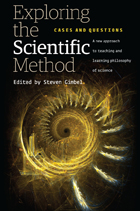
From their grade school classrooms forward, students of science are encouraged to memorize and adhere to the “scientific method”—a model of inquiry consisting of five to seven neatly laid-out steps, often in the form of a flowchart. But walk into the office of a theoretical physicist or the laboratory of a biochemist and ask “Which step are you on?” and you will likely receive a blank stare. This is not how science works. But science does work, and here award-winning teacher and scholar Steven Gimbel provides students the tools to answer for themselves this question: What actually is the scientific method?
Exploring the Scientific Method pairs classic and contemporary readings in the philosophy of science with milestones in scientific discovery to illustrate the foundational issues underlying scientific methodology. Students are asked to select one of nine possible fields—astronomy, physics, chemistry, genetics, evolutionary biology, psychology, sociology, economics, or geology—and through carefully crafted case studies trace its historical progression, all while evaluating whether scientific practice in each case reflects the methodological claims of the philosophers. This approach allows students to see the philosophy of science in action and to determine for themselves what scientists do and how they ought to do it.
Exploring the Scientific Method will be a welcome resource to introductory science courses and all courses in the history and philosophy of science.
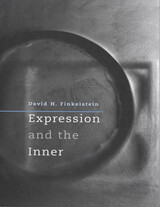
READERS
Browse our collection.
PUBLISHERS
See BiblioVault's publisher services.
STUDENT SERVICES
Files for college accessibility offices.
UChicago Accessibility Resources
home | accessibility | search | about | contact us
BiblioVault ® 2001 - 2024
The University of Chicago Press









